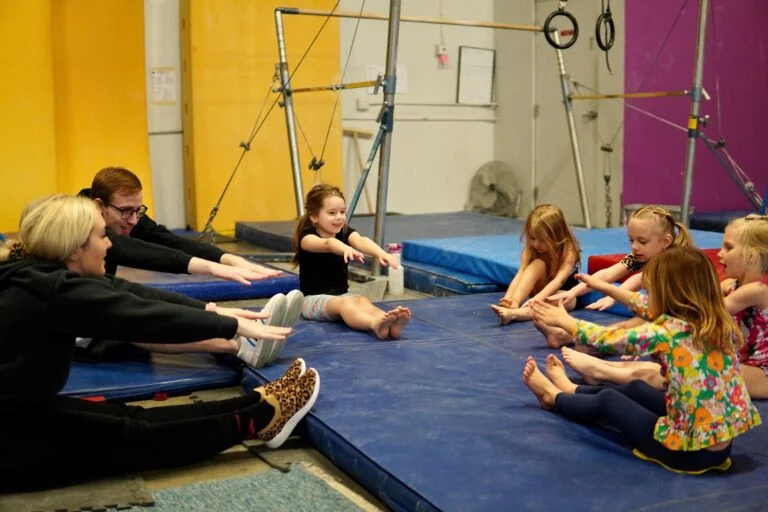Updated 10/5/24
Introduction
Emotional intelligence (EI) is a crucial aspect of a child’s development, encompassing the ability to recognize, understand, and manage emotions effectively. As caregivers, educators, and parents, it is essential to foster emotional intelligence in children to help them navigate life’s challenges and build meaningful relationships. One powerful tool for nurturing emotional intelligence in children is through the practice of yoga. In this blog, we will explore the significance of emotional intelligence in a child’s development and how yoga practices can cultivate self-awareness, empathy, and self-regulation.
The Significance of Emotional Intelligence in Children’s Development
Emotional intelligence is the foundation for overall well-being and success in life. Children with high emotional intelligence are better equipped to handle stress, build positive relationships, and make informed decisions. Furthermore, emotional intelligence positively influences academic performance, mental health, and social interactions. It enables children to understand and express their feelings appropriately while empathizing with others, leading to healthier emotional connections and greater resilience in the face of challenges.

Self-Awareness: Exploring the Inner Landscape
Yoga encourages self-awareness by inviting children to turn their attention inward. Through breathing exercises and mindful movement, children learn to identify their emotions and bodily sensations without judgment. Yoga provides a safe space for children to explore their thoughts and feelings, fostering a deeper understanding of their emotional experiences. By recognizing their emotions, children become better equipped to communicate their needs and emotions effectively.
Empathy: Connecting with Others
Empathy is the ability to understand and share the feelings of others. In yoga, children are encouraged to be mindful not only of their own experiences but also of the experiences of their peers. Partner poses and group activities promote cooperation and mutual support, fostering a sense of empathy among children. As they work together, children learn to appreciate the unique struggles and triumphs of others, creating a compassionate and inclusive environment.
Self-Regulation: Finding Balance and Calm
Yoga practices teach children valuable self-regulation skills by providing tools to manage their emotions in a healthy manner. Breathing exercises, such as deep belly breathing, can help calm their nervous system during moments of stress or anxiety. Yoga poses promote physical balance, which has a direct correlation to emotional balance. As children learn to find stability in their bodies, they also learn to find emotional equilibrium. This self-regulation enables them to make thoughtful choices, handle conflicts peacefully, and manage their impulses effectively.

Mindfulness: Living in the Present
Mindfulness is an integral part of yoga, involving non-judgmental awareness of the present moment. By practicing mindfulness, children can learn to observe their thoughts and emotions without being carried away by them. This skill enhances their ability to respond thoughtfully to situations, rather than reacting impulsively based on emotions. Cultivating mindfulness through yoga empowers children to remain focused and attentive, promoting better concentration and improved emotional responses.
Conclusion
Emotional intelligence is a vital aspect of a child’s development, influencing their well-being, relationships, and success in life. By nurturing emotional intelligence through yoga, children gain valuable skills such as self-awareness, empathy, and self-regulation. Yoga provides a holistic approach to emotional growth, combining physical movement, breathing exercises, and mindfulness practices that empower children to understand their emotions, connect with others on a deeper level, and find inner balance. As caregivers and educators, let us recognize the transformative potential of yoga in shaping emotionally intelligent, empathetic, and resilient individuals who will flourish in every aspect of their lives. So, let us unroll the yoga mat and embark on this journey of emotional growth and well-being with our little yogis. Namaste!
Join Christine McArdle, Author and E-RYT 500, for a Free Webinar:
How Yoga Nurtures Emotional Intelligence and Builds Resilience in Kids. September 9, 2023 at 10:00am-11:00am Pacific (that’s 7:00pm-8:00pm in Madrid and 1:00pm-2:00pm in New York)
WANT TO LEARN EVEN MORE?
Join Christine McArdle
for Therapeutic Kids Yoga Teacher Training online October 1- December 16, 2024.
And help children learn healthy tools for life
Learn how to teach children’s yoga classes in public schools, private institutions, local community centers and online!